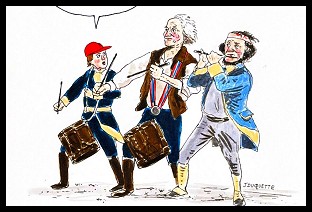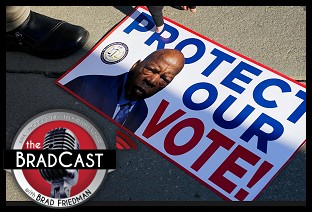 There are a number of reasons why it's difficult to stomach the claim that New Jersey's Republican Gov. Chris Christie is concerned about "public health". His newest proposal for a pricey new excise tax on e-cigs is just one of them.
There are a number of reasons why it's difficult to stomach the claim that New Jersey's Republican Gov. Chris Christie is concerned about "public health". His newest proposal for a pricey new excise tax on e-cigs is just one of them.
In 2010, Christie slashed $7.5 million --- virtually all of the state's investment --- in smoking prevention and cessation support from the state's "Comprehensive Tobacco Control Program". As a result, the American Lung Association (ALA) now ranks NJ as 50th in the nation on this issue, recently noting, they are "the only state in the country to provide no state funding" for such programs.
Christie's gutting of the state's once-robust program has resulted in an "F" grade from the ALA on both "Tobacco Prevention" and "Cessation Coverage", leading them to write: "This lack of funding to help tobacco users quit is a stark contradiction with New Jersey's high tax rate of $2.70 per pack generating over $700 million each year in revenues."
Thus, it's all the more absurd to hear the "fiscally conservative" Christie administration now calling for a massive new "sin tax" on e-cigarettes, which are known to be a far safer alternative to smoking, since "vaping" includes none of the deadly toxins, such as tar and carbon monoxide, found in combustible tobacco.
But "conservative" hypocrisy aside, what makes Christie's new tax and spend plan even more absurd is that his state Treasurer is now claiming their "main concern is public health."
Really? The NJ Star-Ledger editorial board --- which endorsed Christie's re-election last year (though they came to regret it after Christie's "BridgeGate" scandal emerged) --- ain't buying it...
In an editorial today, the board blasted Christie and his administration's purported reasons for taxing e-cigs at the same rate as deadly cigarettes...
Excuse our skepticism, but Christie cut $7.5 million from the state's anti-smoking programs in 2010, and since then the state has spent little to nothing on smoking cessation and education programs. No doubt another main concern is the governor's budget: Christie anticipates $35 million in revenue from this tax.
But do we even know that e-cigarettes are a threat to public health?
The Federal Food and Drug Administration has not yet evaluated them for safety or effectiveness, or issued regulations. All we know is that they can be less addictive than cigarettes, and lack the added tar and toxins. Many researchers say that nicotine alone is not a serious health hazard - that it's the deadly tar in conventional cigarettes that kills you. E-cigarette users avoid that by inhaling a nicotine-laced vapor, which is why it's called "vaping."
Studies show this is at least as effective as nicotine patches in helping people quit smoking - the single largest cause of preventable death in our country, killing about 480,000 people a year.
So there's a real, life-saving benefit to e-cigarettes, which may greatly outweigh any risks. If these gadgets are not known to be an enemy to public health, and may in fact be hugely beneficial, why tax them like cigarettes?
I've spent no small amount of time plowing through all manner of scientific studies in relation to e-cigs over the past year or so (since quitting my own decades-long habit overnight, thanks to the public health miracle of vaping!) and I've noted on the pages of late that the reporting in the mainstream corporate media has been largely terrible on this issue to date. See this absurdity from the New York Times in late March, by way of just one example.
But the Star-Ledger's editorial has it mostly right here. (The one exception being their claim that e-cigs "can be less addictive than cigarettes." I'm not sure where that data point comes from, and I'd be surprised if that was the case for all but those who choose to vape e-liquid containing 0% nicotine.)
Making it more difficult --- or, in this case, more expensive --- for smokers to quit smoking with the use of e-cigs is a deadly idea, as I've noted on a number of recent occasions, such as last month when the L.A. City Council shamefully voted unanimously to ban their use in public spaces, as if they were cigarettes, or as the Minnesota state legislature has recently been considering a similar deadly ban.
The former president of the American Lung Association has called such bans on e-cigs "misguided" and "a public health disservice."
So the Star-Ledger editorial's conclusion, then, seems right on the money:


 A Pretty Weak 'Strongman': 'BradCast' 10/30/25
A Pretty Weak 'Strongman': 'BradCast' 10/30/25 'Green News Report' 10/30/25
'Green News Report' 10/30/25
 Proposal for 'First Politically Viable Wealth Tax' Takes Shape in CA: 'BradCast' 10/29/25
Proposal for 'First Politically Viable Wealth Tax' Takes Shape in CA: 'BradCast' 10/29/25 Monster Storm, Endless Wars, Gamed Elections:
Monster Storm, Endless Wars, Gamed Elections: 'Green News Report' 10/28/25
'Green News Report' 10/28/25 Let's Play 'Who Wants
Let's Play 'Who Wants Sunday 'Cartoonists Dilemma' Toons
Sunday 'Cartoonists Dilemma' Toons Exiled NOAA Scientists Resurrect Critical Disaster Database: 'BradCast' 10/23/25
Exiled NOAA Scientists Resurrect Critical Disaster Database: 'BradCast' 10/23/25  'Green News Report' 10/23/25
'Green News Report' 10/23/25 Trump-Allied GOP Partisan Buys Dominion Voting Systems: 'BradCast' 10/22/25
Trump-Allied GOP Partisan Buys Dominion Voting Systems: 'BradCast' 10/22/25 Trump, Republican Law(lessness) & (Dis)Order: 'BradCast' 10/21/25
Trump, Republican Law(lessness) & (Dis)Order: 'BradCast' 10/21/25 'Green News Report' 10/21/25
'Green News Report' 10/21/25 Celebrating 'No Kings': 'BradCast' 10/20/25
Celebrating 'No Kings': 'BradCast' 10/20/25 Sunday 'How It Started' Toons
Sunday 'How It Started' Toons SCOTUS Repubs Appear Ready to Gut Rest of Voting Rights Act: 'BradCast' 10/16/25
SCOTUS Repubs Appear Ready to Gut Rest of Voting Rights Act: 'BradCast' 10/16/25 'Green News Report' 10/16/25
'Green News Report' 10/16/25 The 'Epstein Shutdown' and Other Autocratic Nightmares: 'BradCast' 10/15/25
The 'Epstein Shutdown' and Other Autocratic Nightmares: 'BradCast' 10/15/25 Group Vows to Block MO's GOP U.S. House Gerrymander: 'BradCast' 10/14/25
Group Vows to Block MO's GOP U.S. House Gerrymander: 'BradCast' 10/14/25 Trump Labor Dept. Warns Trump Policies Sparking Food Crisis: 'BradCast' 10/9/25
Trump Labor Dept. Warns Trump Policies Sparking Food Crisis: 'BradCast' 10/9/25 Trump's Losing Battles: 'BradCast' 10/8/25
Trump's Losing Battles: 'BradCast' 10/8/25 Trump, Roberts and His Stacked, Packed and Captured SCOTUS: 'BradCast' 10/7/25
Trump, Roberts and His Stacked, Packed and Captured SCOTUS: 'BradCast' 10/7/25 Trump Attempting His 'Invasion from Within': 'BradCast' 10/6/25
Trump Attempting His 'Invasion from Within': 'BradCast' 10/6/25 Biden Budget Expert: Mass Firings in Shutdown 'Illegal': 'BradCast' 10/2/25
Biden Budget Expert: Mass Firings in Shutdown 'Illegal': 'BradCast' 10/2/25 Why is DOJ Suing 'Blue' States for Their Voter Databases?: 'BradCast' 10/1/25
Why is DOJ Suing 'Blue' States for Their Voter Databases?: 'BradCast' 10/1/25
 VA GOP VOTER REG FRAUDSTER OFF HOOK
VA GOP VOTER REG FRAUDSTER OFF HOOK Criminal GOP Voter Registration Fraud Probe Expanding in VA
Criminal GOP Voter Registration Fraud Probe Expanding in VA DOJ PROBE SOUGHT AFTER VA ARREST
DOJ PROBE SOUGHT AFTER VA ARREST Arrest in VA: GOP Voter Reg Scandal Widens
Arrest in VA: GOP Voter Reg Scandal Widens ALL TOGETHER: ROVE, SPROUL, KOCHS, RNC
ALL TOGETHER: ROVE, SPROUL, KOCHS, RNC LATimes: RNC's 'Fired' Sproul Working for Repubs in 'as Many as 30 States'
LATimes: RNC's 'Fired' Sproul Working for Repubs in 'as Many as 30 States' 'Fired' Sproul Group 'Cloned', Still Working for Republicans in At Least 10 States
'Fired' Sproul Group 'Cloned', Still Working for Republicans in At Least 10 States FINALLY: FOX ON GOP REG FRAUD SCANDAL
FINALLY: FOX ON GOP REG FRAUD SCANDAL COLORADO FOLLOWS FLORIDA WITH GOP CRIMINAL INVESTIGATION
COLORADO FOLLOWS FLORIDA WITH GOP CRIMINAL INVESTIGATION CRIMINAL PROBE LAUNCHED INTO GOP VOTER REGISTRATION FRAUD SCANDAL IN FL
CRIMINAL PROBE LAUNCHED INTO GOP VOTER REGISTRATION FRAUD SCANDAL IN FL Brad Breaks PA Photo ID & GOP Registration Fraud Scandal News on Hartmann TV
Brad Breaks PA Photo ID & GOP Registration Fraud Scandal News on Hartmann TV  CAUGHT ON TAPE: COORDINATED NATIONWIDE GOP VOTER REG SCAM
CAUGHT ON TAPE: COORDINATED NATIONWIDE GOP VOTER REG SCAM CRIMINAL ELECTION FRAUD COMPLAINT FILED AGAINST GOP 'FRAUD' FIRM
CRIMINAL ELECTION FRAUD COMPLAINT FILED AGAINST GOP 'FRAUD' FIRM RICK SCOTT GETS ROLLED IN GOP REGISTRATION FRAUD SCANDAL
RICK SCOTT GETS ROLLED IN GOP REGISTRATION FRAUD SCANDAL VIDEO: Brad Breaks GOP Reg Fraud Scandal on Hartmann TV
VIDEO: Brad Breaks GOP Reg Fraud Scandal on Hartmann TV RNC FIRES NATIONAL VOTER REGISTRATION FIRM FOR FRAUD
RNC FIRES NATIONAL VOTER REGISTRATION FIRM FOR FRAUD EXCLUSIVE: Intvw w/ FL Official Who First Discovered GOP Reg Fraud
EXCLUSIVE: Intvw w/ FL Official Who First Discovered GOP Reg Fraud GOP REGISTRATION FRAUD FOUND IN FL
GOP REGISTRATION FRAUD FOUND IN FL

































